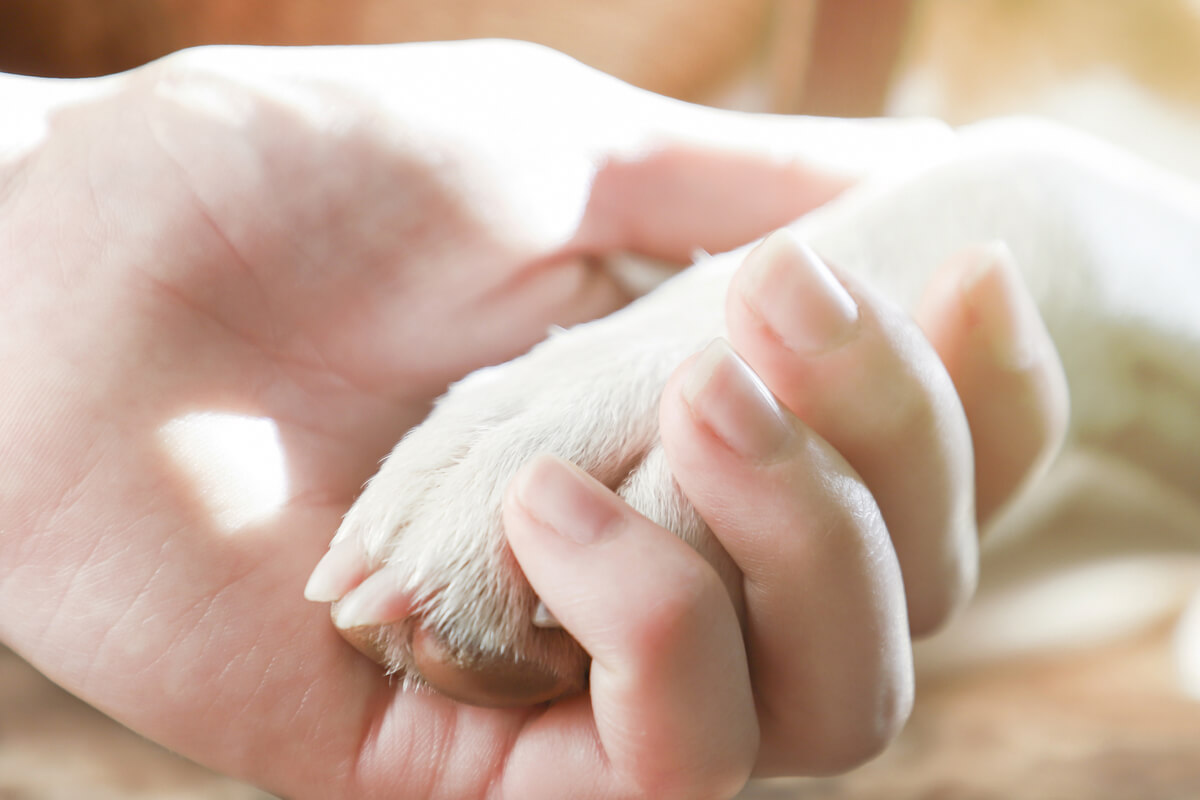Messages of Support for the Loss of a Pet


Written and verified by the psychologist Sara González Juárez
More and more people accept that animals living in the home are part of the family. Because of this, the way of being supportive when someone suffers the loss of a pet is becoming more and more similar to that of our human relatives.
However, recognizing pet bereavement as necessary doesn’t mean that you are always the right person to offer comfort to your loved one. In fact, being a good companion in these hard times is a task that requires certain skills. Here we’ll help you know what they are.
Grief support
Grief is a natural response to the loss of a loved one. It’s a different experience for each person, so there are no universal and effective messages of support for each and every situation. Many factors influence the emotional pain: how sudden the animal’s death was, the owner’s sensitivity, their coping skills, among other things.
So what can we do to help a person get over the death of their pet? Is it possible to ease their grief? In the following sections, we bring you some tips that will help you to be a good companion during this period.

The grieving process shouldn’t be skipped
You can’t lose a loved one without experiencing pain. Grieving is a natural process: a person needs to go through it and it’s normal to need time to heal. Your desire to ease someone’s suffering is probably sincere, but you must respect their times and needs.
The person’s grief is valid
Supporting someone who is grieving the loss of a pet shouldn’t mean overriding their feelings. Phrases such as “it was just a dog” or “the death of a canary isn’t like the death of a cat” only imply to the bereaved person that you don’t respect their emotions.
Downplaying the emotional charge of someone else’s grief shows a clear lack of empathy.
Put the needs of that person first
It’s common to find testimonies of people who have perceived little emotional support during their grieving process, especially when it’s the death of a pet. People often say that people who try to help them try to simply alleviate the pain of grief or downplay its importance.
If you really want to help someone who has lost their animal, you should never downplay their pain. It’s likely that through your empathy you yourself will also suffer, but remember that the one who needs help is the other person.
How to help a person in mourning
Reading the recommendations above, you may have found some drawbacks in them. This is normal, as each person experiences the death of a loved one in his or her own way. Because of this, here are some more specific recommendations to help a friend who has suffered the loss of a pet.
What do they need?
If the mourner is a person close to you, you’ll know what they need in low moments. They may need to talk about it, they may need their mind taken off it, a simple hug, or they may just need to be alone. Asking them about what they need is also a good way to be there for them, as they’ll have tangible proof of your concern, even if you already know how to help.
Give advice only when they ask for it
It’s natural to want to give advice as a way of supporting someone close to you as they get over the loss of a pet, but, in times of intense grief, it may not be well received (especially if it’s simplistic advice, such as “you just need to get out”). It’s up to the person themselves to manage their grief and take steps to alleviate their suffering.
Practice active listening
A person who expresses their grief to others is usually sending a message more directed at themselves than to those around them. Saying out loud what you are feeling is part of coming to terms with the animal’s death and moving toward recovery.
Pay attention to what your loved one says, but don’t try to correct or “fix” their words. Ask questions, keep them talking by keeping quiet yourself, or simply stay by their side while they vent.
Avoid simplistic condolences
It’s natural to want to find a message to ease the pain a person feels when their animal companion dies. Words are healing in some scenarios, however, we ‘re sorry to say that this isn’t always true in the case of death. Some messages to avoid are these:
- “I know how you feel”: Unless you have experienced it as closely as that person, you can’t claim to know how they feel. It’s an innocent phrase full of good intentions, but, in some people, it brings rejection.
- “He’s not suffering anymore” or “he’s resting now”: Phrases like these can be helpful if the mourner says it to themselves. Coming from the outside it puts the focus on the animal that has died, when the one you want to comfort is the one who remains in this world.
- “My dog died of…”: Sharing your own experience with grief can be beneficial in more advanced stages, although it brings nothing when the animal has just died.
- “At least he didn’t die from…”: It’s of no comfort to think that the animal could have suffered more than they actually did before their death.
- “Now you have to be strong”: Another phrase that is full of good intentions, but, from the grieving person’s perspective, it only puts pressure on them to recover. Someone who has just suffered a loss has the right to be vulnerable.

One last tip
It’s natural to feel sadness when a family pet dies, but it’s also normal to recover from it. If you notice that someone close to you is grieving for a very long time, and not getting better, it might be a good idea to see a psychologist. Recognizing pathological grief is a expert’s job, but providing support during the loss of a pet doesn’t end after the ritual of saying goodbye.
More and more people accept that animals living in the home are part of the family. Because of this, the way of being supportive when someone suffers the loss of a pet is becoming more and more similar to that of our human relatives.
However, recognizing pet bereavement as necessary doesn’t mean that you are always the right person to offer comfort to your loved one. In fact, being a good companion in these hard times is a task that requires certain skills. Here we’ll help you know what they are.
Grief support
Grief is a natural response to the loss of a loved one. It’s a different experience for each person, so there are no universal and effective messages of support for each and every situation. Many factors influence the emotional pain: how sudden the animal’s death was, the owner’s sensitivity, their coping skills, among other things.
So what can we do to help a person get over the death of their pet? Is it possible to ease their grief? In the following sections, we bring you some tips that will help you to be a good companion during this period.

The grieving process shouldn’t be skipped
You can’t lose a loved one without experiencing pain. Grieving is a natural process: a person needs to go through it and it’s normal to need time to heal. Your desire to ease someone’s suffering is probably sincere, but you must respect their times and needs.
The person’s grief is valid
Supporting someone who is grieving the loss of a pet shouldn’t mean overriding their feelings. Phrases such as “it was just a dog” or “the death of a canary isn’t like the death of a cat” only imply to the bereaved person that you don’t respect their emotions.
Downplaying the emotional charge of someone else’s grief shows a clear lack of empathy.
Put the needs of that person first
It’s common to find testimonies of people who have perceived little emotional support during their grieving process, especially when it’s the death of a pet. People often say that people who try to help them try to simply alleviate the pain of grief or downplay its importance.
If you really want to help someone who has lost their animal, you should never downplay their pain. It’s likely that through your empathy you yourself will also suffer, but remember that the one who needs help is the other person.
How to help a person in mourning
Reading the recommendations above, you may have found some drawbacks in them. This is normal, as each person experiences the death of a loved one in his or her own way. Because of this, here are some more specific recommendations to help a friend who has suffered the loss of a pet.
What do they need?
If the mourner is a person close to you, you’ll know what they need in low moments. They may need to talk about it, they may need their mind taken off it, a simple hug, or they may just need to be alone. Asking them about what they need is also a good way to be there for them, as they’ll have tangible proof of your concern, even if you already know how to help.
Give advice only when they ask for it
It’s natural to want to give advice as a way of supporting someone close to you as they get over the loss of a pet, but, in times of intense grief, it may not be well received (especially if it’s simplistic advice, such as “you just need to get out”). It’s up to the person themselves to manage their grief and take steps to alleviate their suffering.
Practice active listening
A person who expresses their grief to others is usually sending a message more directed at themselves than to those around them. Saying out loud what you are feeling is part of coming to terms with the animal’s death and moving toward recovery.
Pay attention to what your loved one says, but don’t try to correct or “fix” their words. Ask questions, keep them talking by keeping quiet yourself, or simply stay by their side while they vent.
Avoid simplistic condolences
It’s natural to want to find a message to ease the pain a person feels when their animal companion dies. Words are healing in some scenarios, however, we ‘re sorry to say that this isn’t always true in the case of death. Some messages to avoid are these:
- “I know how you feel”: Unless you have experienced it as closely as that person, you can’t claim to know how they feel. It’s an innocent phrase full of good intentions, but, in some people, it brings rejection.
- “He’s not suffering anymore” or “he’s resting now”: Phrases like these can be helpful if the mourner says it to themselves. Coming from the outside it puts the focus on the animal that has died, when the one you want to comfort is the one who remains in this world.
- “My dog died of…”: Sharing your own experience with grief can be beneficial in more advanced stages, although it brings nothing when the animal has just died.
- “At least he didn’t die from…”: It’s of no comfort to think that the animal could have suffered more than they actually did before their death.
- “Now you have to be strong”: Another phrase that is full of good intentions, but, from the grieving person’s perspective, it only puts pressure on them to recover. Someone who has just suffered a loss has the right to be vulnerable.

One last tip
It’s natural to feel sadness when a family pet dies, but it’s also normal to recover from it. If you notice that someone close to you is grieving for a very long time, and not getting better, it might be a good idea to see a psychologist. Recognizing pathological grief is a expert’s job, but providing support during the loss of a pet doesn’t end after the ritual of saying goodbye.
All cited sources were thoroughly reviewed by our team to ensure their quality, reliability, currency, and validity. The bibliography of this article was considered reliable and of academic or scientific accuracy.
- Pet Loss and Grief Resources. (s. f.). Best Friends Animal Society. Recuperado 16 de noviembre de 2021, de https://resources.bestfriends.org/article/pet-loss-and-grief-resources
- Figueroa, M., Cáceres, R. & Torres, A. (2020). Duelo: Manual de Capacitación para Acompañamiento y Abordaje de Duelo. FUNDASIL-UNICEF. Recuperado el 29 de octubre de 2022, disponible en: https://www.unicef.org/elsalvador/media/3191/file/Manual%20sobre%20Duelo.pdf
This text is provided for informational purposes only and does not replace consultation with a professional. If in doubt, consult your specialist.








